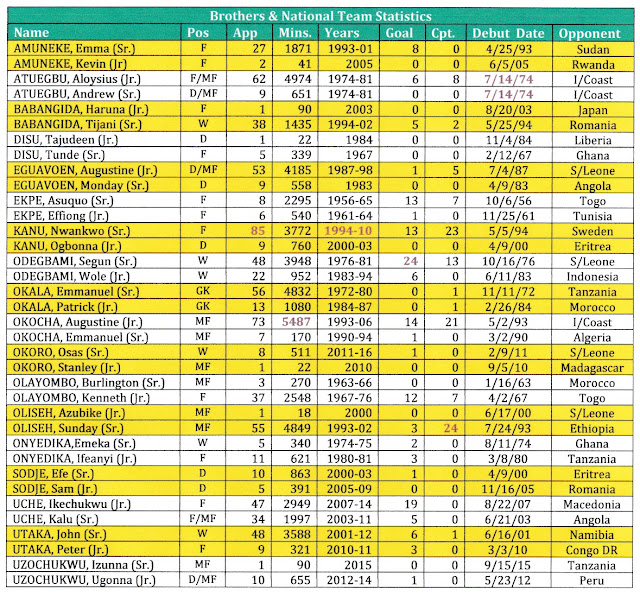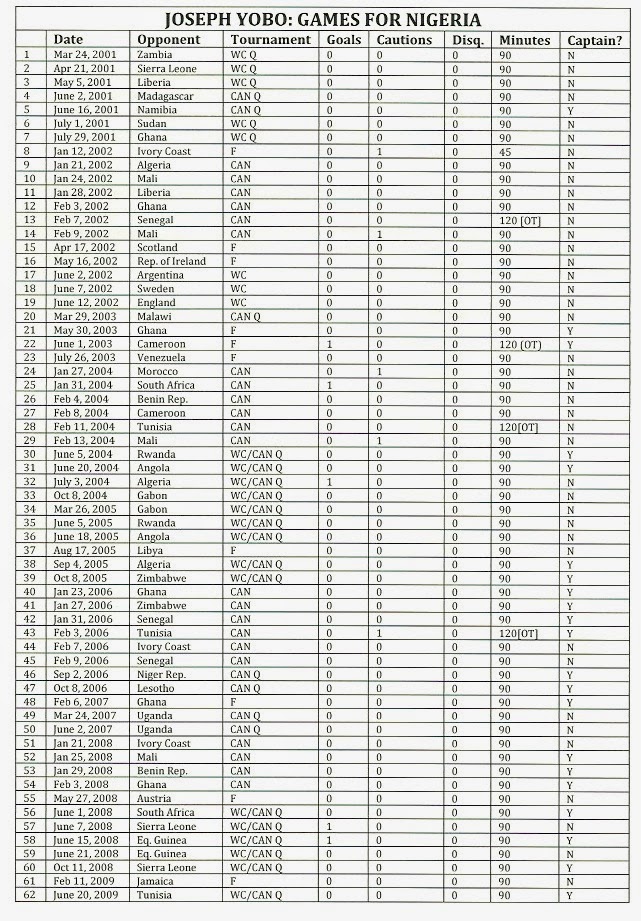Siblings, Father-Son national team careers in Nigeria ...
Today, we have searched through the database to bring you statistics comparing members of a footballing family. The topic is about comparing brothers who have played for the Nigerian national team and comparing fathers and sons who also have played for the Nigerian national team.
Brother Statistics
The brother data shows 18 such relationships since the start of the Nigerian national team in 1949. The most celebrated ones are the Okalas (Emmanuel and Patrick), Uches (Kalu and Ikechukwu), and Eguavoens (Monday and Augustine). The only two brothers to debut in the same game are the Atuegbu brothers when Andrew and Aloysius debuted against Ivory Coast on July 14 of 1974. Andrew ended up playing far less games because he chose to leave club soccer in Nigeria to study abroad in the United States. The entire Atuegbu playing clan of brothers also included Mathew and Nicholas, who did not make it to the national team level.
Examining the data shows that often one brother may not be as good as the other, as far as playing in the national team is concerned. However, the Atuegbus, Eguavoens, Ekpes, Odegbamis, Okalas, Onyedikas, and Uches were brother pairs that clearly deserved their call ups in the national team and it showed in their display. In terms of scoring, both the Odegbami and Uche brothers were legitimate threats.
Father/Son Statistics
We found data for four (4) father and son records. The most celebrated of such father-son playing statistics has to be Teslimi "Thunder" Balogun and his son, Kayode "Zege" Balogun. Of Teslimi's sons, one would have predicted that Tunde Balogun, would be the one most likely to follow his father's footsteps by playing for Nigeria and likely earning more appearances than his father. His father's career featured just 8 appearances because he played in a period when national team appearances were highly limited. However, in spite of Tunde dominating high school soccer and earning a scholarship to play at a USA university, he never made it to the Nigerian national team. Instead, it was left for his much younger brother, Kayode, to earn a solitary appearance for Nigeria against Canada in 1984.The father, Tesilimi "Thunder," played in Nigeria's first ever game on October 8 of 1949. By then, he was already in mid career. Surely, he is one player who would have amassed a far more impressive statistics for Nigeria if the national team was created much earlier and if he had the benefit of far more games than the one game a year played by Nigeria in those early years.
Table of Statistics
Below are the rest of the records. Enjoy and please let us know if you think that we have left out a family that should have been listed.
Below are the rest of the records. Enjoy and please let us know if you think that we have left out a family that should have been listed.




Hello
ReplyDeleteI think you left out the Eyo Family
I grew up with them in Ikeja Lagos.
The Senior Eyo actually was a goalkeeper for the Nigerian Railways.
Tony Eyo went to United Local Authority High School now Ikeja Grammar School in Oshodi before he transferred to St Finbarr’s College in Akoka.
Tony Eyo was the most celebrated #9 high school player in 70s. He played for the Nigerian Academicals and had a short stint with the Green Eagles. St Finbarr’s was coached at that time by the famed Coach Eto Amaechina.
Martins Eyo was the third of the Eyo boys. He played for St Finbarr’s College and later on for Ibadan Polytechnic. After graduating , Martins went on to play for Julius Berger football team in Lagos. Martins Eyo was one of the players that played the #10 position when Nigeria Green Eagles lost Thompson Usiyan , perhaps one of the greatest goal scorer we ever had. He left the national team to study overseas in a Canadian Unversity.
Martins stared briefly for the Green Eagles.
The Eyo Soccer Family
Pa Eyo
Tony Eyo
Martins Eyo.